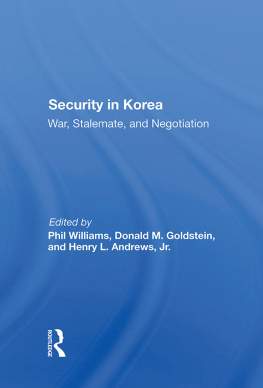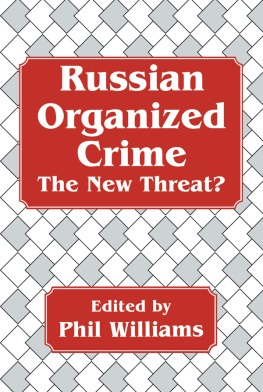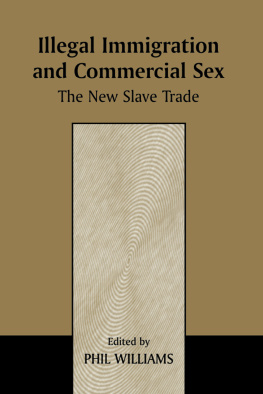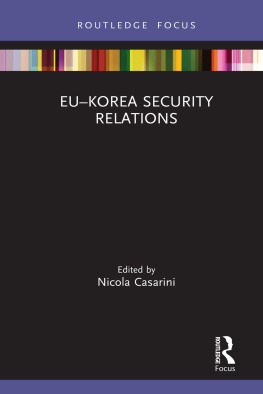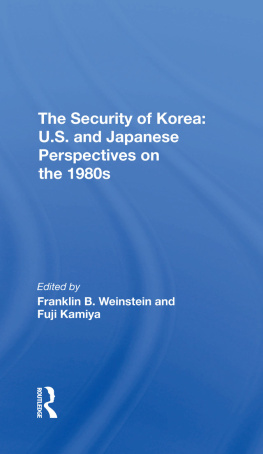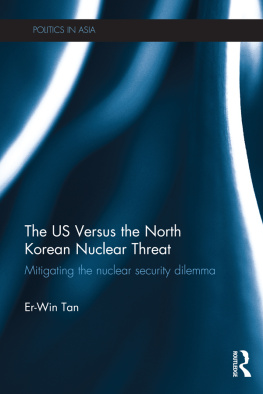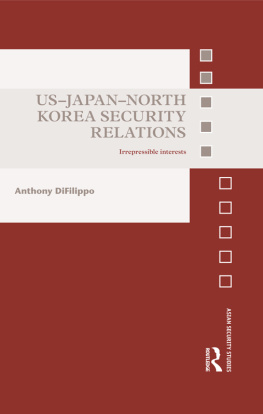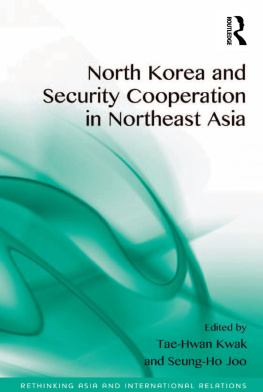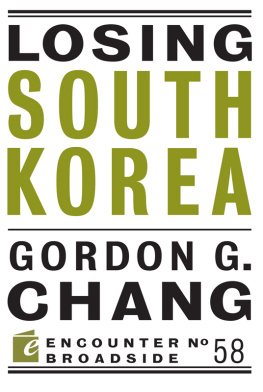Security in Korea

Portrait of General Matthew Bunker Ridgway
Ridgway Series in International Security Studies
Paul Y. Hammond and Phil Williams,
Series Editors
Security in Korea: War, Stalemate, and Negotation,
edited by Phil Williams, Donald M. Goldstein, and Henry L. Andrews, Jr.
Shadows and Substance: The Chemical Weapons Convention,
edited by Benoit Morel and Kyle Olson
Forthcoming
Through a Glass Darkly: The impact of Cognitive Psychological Factors on Crisis Decision-making,
J. Philip Rogers
Security in Korea
War, Stalemate, and Negotiation
Edited by
Phil Williams, Donald M. Goldstein, and Henry L. Andrews, Jr.
First published 1994 by Westview Press, Inc.
Published 2019 by Routledge
52 Vanderbilt Avenue, New York, NY 10017
2 Park Square, Milton Park, Abingdon, Oxon OX14 4RN
Routledge is an imprint of the Taylor & Francis Group, an informa business
Copyright 1994 Taylor & Francis
All rights reserved. No part of this book may be reprinted or reproduced or utilised in any form or by any electronic, mechanical, or other means, now known or hereafter invented, including photocopying and recording, or in any information storage or retrieval system, without permission in writing from the publishers.
Notice:
Product or corporate names may be trademarks or registered trademarks, and are used only for identification and explanation without intent to infringe.
Library of Congress Cataloging-in-Publication Data
Security in Korea : war, stalemate, and negotiation / edited by Phil Williams, Donald M. Goldstein, and Henry L. Andrews, jr.
p. cm. (Ridgway series in international security studies)
Includes bibliographical references and index.
ISBN 0-8133-8884-8
1. Korean War, 1950-1953. 2. National securityKorea (South) 3. Korea (South)Military relationsUnited States. 4. United StatesMilitary relationsKorea (South) 5. Korean reunification question (1945- ) I. Williams, Phil, 1948- . II. Goldstein, Donald M. III. Andrews, Henry L. IV. Series.
DS918.S43 1994
951.904'2dc20
94-12043
CIP
ISBN 13: 978-0-367-28695-8 (hbk)
This book is dedicated by the faculty, staff, and students of the Ridgway Center to General Matthew Bunker Ridgway, 1895-1993: patriot, soldier, commander, statesman, author, and hero of the Korean War.
Contents
, Mrs. Matthew B. Ridgway
, Donald M. Goldstein
, Phil Williams, Donald M. Goldstein, and Henry L. Andrews, Jr.
PART ONE
The War
, Kim Chull Baum
, Clay Blair
, Allen S. Whiting
, John S. Spanier
, Thomas Allen
PART TWO
The Consequences
, Phil Williams, Henry L. Andrews, Jr., and Peter D. Duerst
, Ronald H. Spector
, Joseph R. Wood
PART THREE
Beyond Stalemate
, Phil Williams
, William F. Smith
, James F. Goodby
, Gerald Segal
, Henry J. Andrews, Jr., and Peter D. Duerst
"...to contribute to the development of leaders in government with the vision to see, the wisdom and integrity to choose, and the moral courage to act."
Matthew Bunker Ridgway General U.S. Army (retired) April 21, 1988
My beloved husband, Matt Ridgway, spoke these words at the ceremony held on the occasion of the dedication of the University of Pittsburgh's Ridgway Center for International Security Studies in his name As I reflect on the weeks preceding that special occasion in our lives, I recall that he accepted this recognition with deep gratitude and a very humble pride. He had previously suggested other names from the history of American security affairs who he thought were more deserving of this tribute. However, he accepted this honor because of his belief in the stature of the University of Pittsburgh and its potential to influence future decision-makers and researchers.
General Ridgway was deeply committed to educating fixture public leaders and scholars through access to extraordinary academic resources such as those rt the University of Pittsburgh. Through the Ridgway Center, his dedication to world peace and security lives on (or future generations in those who study there.
General Ridgway would be very proud to know of this book, accomplished through a collaborative effort by faculty and young scholars at the Ridgway Center and other analysts in the field of Asian security. My husband's service as commander of the 8th U.S. Army during the Korean War, and later as Commander in Chief of United Nations forces in Korea and the U.S. Far East Command in Japan, offered him a role in the defense and security policy in the Pacific Rim. He would undoubtedly find Security in Korea: War, Stalemate, and Negotiation to be an important contribution to the public-policy literature on Korea because of its incisive analyses of the past and future of Korean security. General Ridgway would note with great satisfaction that this book fully supports all the reasons he so strongly encouraged the academic pursuits of the Ridgway Center, it is part of his legacy, in which I am proud to participate.
Mrs . Matthew . Ridgway
fox Chapel, Pennsylvania
March 1, 1994
Donald M. Goldstein
In any large war, there are always a few brilliant commanders who, through complete dedication to duty, manly humbleness, dislike of publicity, or oversight on the part of their superiors, fail to receive the plaudits of the public or the recognition which their performance merited. Such a commander was Matthew Bunker Ridgway, the namesake of the Matthew B. Ridgway Center for International Security Studies at the University of Pittsburgh, to whom this book is dedicated.
Matthew . Ridgway was born on March 3, 1895, at Fort Monroe, Virginia, on the shores of the Virginia peninsula. His father, Thomas, was a West Point graduate (class of 1863). An artillery specialist, his father retired after World War I with the rank of Colonel. His mother, Ruth Starback Bunker, of Garden City, New York, was a concert pianist.
After growing up on army posts, Ridgway never really considered any career other than the military. He enrolled at West Point in the summer of 1913 and graduated in 1917, two weeks after the U.S. declared war on Germany. Ridgway was eager to test his mettle in the trenches of France, but, by the luck of the draw, he was ordered back to West Point as an instructor in Romance languages. It was a bitter disappointment to him because he missed the "Great War." While at West Point, he worked for Douglas MacArthur for nine months as a graduate manager of athletics.
During the ensuing years, Ridgway moved up the rungs of the small, peacetime army and was selected for important positions. He attended both the Army Command and General Staff School and the Army War College. He was considered by his superiors as bright and a quick study, and he had a facility with words that enabled him, with comparative ease, to draft complicated war plans, analytical staff papers, and speeches. He became one of approximately a dozen army officers to master the Spanish language. This led to several high-level, politico-military assignments in Lalin America which broadened and enriched his career.

